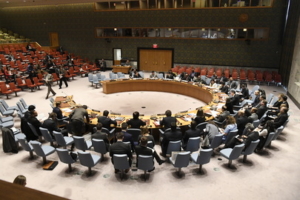 Just days after the UN Security Council passed a comprehensive resolution on counterterrorist financing, it held an informal session to hear about strengthening the rule of law in maintaining international peace and security, focusing on international humanitarian law (IHL). The UN’s Under-Secretary General for Humanitarian Affairs, Mark Lowcock, and IHL experts from the International Committee of the Red Cross and Harvard Law School explained increased threat to aid operations by both states and non-state armed groups that ignore protections and standards afforded by IHL. In response, the UN’s meeting summary notes that “Council members stressed the need to protect aid workers and ensure that the humanitarian space remains impartial, neutral and free from politicization.”
Just days after the UN Security Council passed a comprehensive resolution on counterterrorist financing, it held an informal session to hear about strengthening the rule of law in maintaining international peace and security, focusing on international humanitarian law (IHL). The UN’s Under-Secretary General for Humanitarian Affairs, Mark Lowcock, and IHL experts from the International Committee of the Red Cross and Harvard Law School explained increased threat to aid operations by both states and non-state armed groups that ignore protections and standards afforded by IHL. In response, the UN’s meeting summary notes that “Council members stressed the need to protect aid workers and ensure that the humanitarian space remains impartial, neutral and free from politicization.”
The need to protect “humanitarian space” is especially important in light of Security Council Resolution 2462, approved on March 28. It requires member states to criminalize anti-terrorist financing and take a robust approach to enforcement, incorporating broad definitions of what constitutes “terrorist financing.” Although the resolution includes numerous references to states’ obligations to make counterterrorist financing measures consistent with IHL, international human rights and international refugee law, it does not provide specific parameters for how humanitarian action should be protected. Some human rights groups have expressed concern that lack of guidance or a mechanism to enforce these protections will put aid workers and human rights defenders at risk of arrest.
The Minister for Germany cited the need to help humanitarian actors to provide states with “necessary know-how” on IHL, noting that more non-state armed groups are involved in conflicts than in the past, saying “Humanitarian workers need clarity about the legal framework within which they are operating.” The Minister for Europe encouraged the Council to can help ensure humanitarian workers are protected.
Lowcock’s comments provide data on the alarming extent of attacks on aid workers, particularly medical personnel. He called for parties to conflict to be trained in IHL. Peter Mauer, President of the ICRC, said “the Geneva Conventions are not up for negotiation” and the international community should fight attempts to manipulate or politicize principled humanitarian action. David Millebrand of the International Rescue Committee asked the council,“Will you block attempts to criminalize our ability to engage with armed actors in the name of counter-terror restrictions? … Will you seek and speak the truth no matter how powerful the state, how sensitive the topic, or how uncomfortable the question?”
Naz Modirzadeh of Harvard Law School’s Program on International Law and Armed Conflict noted that the new resolution, as well as previous Security Council resolutions, call for respecting IHL in counterterrorism contexts but encouraged the Council to go beyond generic references to address the “diverse and consequential” impacts of counterterrorism measures.
A transcript of the session is available here.
